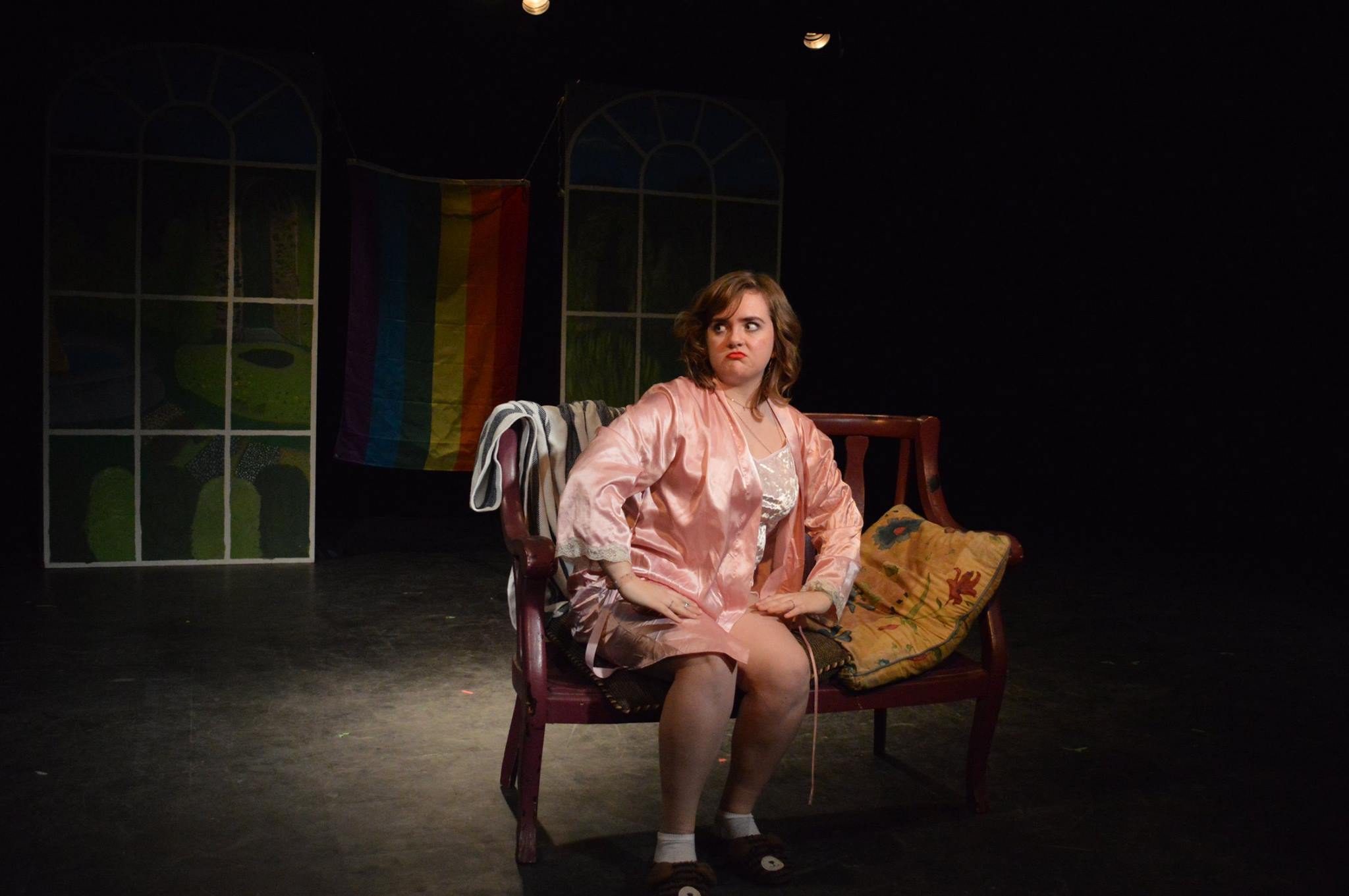Every year, Player’s Theatre’s Drama Festival highlights the abundance of student talent that McGill’s theatre scene has to offer. Showing until Feb. 23, the festival offers six original short plays written, directed, produced, and performed by students. Stories that depicted everything from a first date between high-schoolers to an existential drama set in 1930s Harlem graced the stage at the Mainline Theatre.
Young Love
Leo Stillinger, Staff Writer
This brilliant and concise comedy tells the story of a high school first date in the style of a Discovery Channel documentary. Narrated by Steven Finley, the audience peers into to a cringeworthy natural spectacle of medium-sized proportion: The teenage movie date. Viewers watch in suspense as Ari (Liana Brooks, U3 Science) and Bea (Isobel Macleod) struggle through conversational miscues, spilled popcorn, and their own mutual attraction. Finley steals the show as the eccentric narrator, but Brooks and Macleod are equally captivating in their portrayal of the sweet and self-conscious lovebirds. Victoria Stevens’ (U1, Education) script and Hope Kelly’s direction were both perfect, and this tour de force left the audience howling with laughter.
A Man in Hue
Leo Stillinger, Staff Writer
Written by Steve Greenwood, A Man in Hue was a charming amalgam of Shakespearean theatre: An adaptation of Twelfth Night featuring characters from The Tempest. According to Greenwood’s introduction, both plays are “rich with queerness,” and the adaptation brought Shakespeare’s complex network of homoerotic tensions to the fore. Featuring unrequited lovers, power-grabbing queens, and twin siblings who swap suitors, A Man in Hue was an entertaining dive into a hybrid world. Caroline Portante’s (U4 Arts) direction brought the script, which mixes Shakespearean diction with modern swear words, to its full comic potential. A Man in Hue represents queer relationships with a clever twist on Shakespearean scholarship, and it pulls off this performance with aplomb.
Mike and Jo (Jo & Mike)
Nicholas Raffoul, Staff Writer
In an Eternal Sunshine of the Spotless Mind-esque production that takes place in the near-future dystopia, exes Jo (Ana Krutchinsky, U2 Arts) and Mike (James Pallato, U2 Arts) have to reconcile their differences and find themselves on good terms. If they fail to meet this seemingly simple objective, they face expulsion from their city. To promote maximum efficiency, the city’s government requires that all citizens fully cooperate with each other. Thus, the two characters are forced into ‘Relationship Recovery,’ an absurd machine invented by a Nurse (Maeve Williams, U1 Arts) with the help of her intern (Ethan Mendell, U1 Arts & Sciences), in which Mike and Jo unpack their relationship, and learn how to move on. The process forces the couple to sit in a room and watch holograms of their bittersweet memories, including the first time they met, their first date, and their breakup. Light and sound effects create the illusion of the latest cutting-edge advancement in relationship technology. Written by Kate Hammer, in her third year at Concordia studying Creative Writing and French, and directed by Tess Capern (U1 Arts), Mike and Jo provides an interesting perspective on breakups and communicating with an ex.
The Bottomless Pit in the Back Room of Nick’s Speakeasy
Nicholas Raffoul, Staff Writer
After selling his soul to the devil, con-man and aspiring musician Tom (Harry Skinner, U3 Music) tries to cheat his soul back from Pinch (Sydney Gemin, U3, Management), Satan is disguise. He tries to win it back in a preposterous card game with Pinch and Zoras (Jen Ower), a graceful and witty angel, losing terribly. In an attempt to settle his bet and replace his soul, Tom scrambles around 1930s Harlem hoping to find and con a gullible stranger out of their soul before the devil comes to collect his. He meets, among others, Cleopatra (Gretel Kahn, U3, Arts), a sharp and melodramatic hospital patient whose illness has forced her into solitude. The trio of Kahn, Ower, and Gemin, play two hilarious roles each, allowing for a diverse range of likable characters in a small cast. With hilarious performances by Kahn and Ower, and a ridiculous card game, The Bottomless Pit in the Back Room of Nick’s Speakeasy offers silly and lovable characters, witty comebacks, and insight into the consequences of betting against the devil herself.
Yellow Room
Diana Viola, Contributor
Yellow Room, written by Paige Lawson (U1 Arts) and directed by Summer Mahmud (U2, Arts), reconstructs friends Flynn and Sloane’s blurry memories of a summer night spent in the bedroom of an old friend whose identity remains a mystery for the majority of the play.
Sloane, played by Victoria Stevens, is intent on ensuring that Flynn’s (Laine Berry, U1, Science) attempts to downplay the story do not obscure the truth. Gretel Kahn (U3 Arts), who portrays Flynn and Sloane’s mysterious friend, and Sofie Farkas (U2 Arts), as Lisa, her significant other, slowly unveil the truth about the teenagers’ tumultuous relationships and the misremembered events of the fateful summer night. The play’s ending relieves the tension that builds between the characters over the course of the story but leaves the audience questioning the reliability of the story’s narrators.
8 ½ Collisions
Diana Viola, Contributor
Written by Danielle Eyer, 8 ½ Collisions is an unflinching portrayal of mental illness following Ferris Powell (Nathan Mendel) and June Hayes (Ines Vieux Francoeur, U1 Arts), during their stays in a psychiatric hospital. Both are trapped by the loneliness of their illnesses and are at the mercy of Mania (Leya Gervais), an omnipresent puppeteer who controls their actions. Mania commands that Ferris and June meet just eight times over the course of their stays, allowing the character’s to explore the intersections of their illnesses. “Who was the last person you met? Will you keep in touch? Did you catch their name?” These are some questions, written in the program, that director Charles Atkinson (U0 Arts) poses to his audience, encouraging viewers to reflect on how a single encounter could change their lives. 8 ½ Collisions further questions how much control individuals truly have over their own lives.









